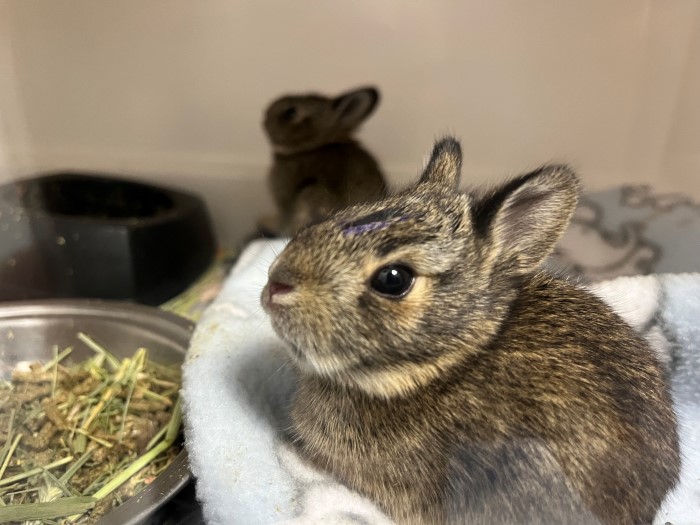This adult male American white pelican (Pelecanus erythrorhynchos) presented to the Wildlife Medical Clinic in late November. The finders had been watching him on a local lake for the summer and were concerned that he couldn’t fly. When he failed to migrate south in the fall, they knew he was in trouble & brought him to us!

At triage, we found that he was missing part of his right wing. Remarkably, the amputation site was completely healed with no blood or signs of recent injury. The rest of his exam found nothing significant, but since the pelican could not fly with a partially amputated wing and this species migrates great distances each spring and fall, he was not releasable. On the bright side, this pelican displayed a calm, inquisitive demeanor around people and was otherwise healthy. Wanting to advocate for him to the best of our ability, we had to consider both the short- and long-term impacts of our care and his overall welfare.
After a complete behavioral assessment, he was determined to be a potential candidate for living under long term human care. As such, we began looking for a facility who could meet his forever needs. In the interim, due to his large size, he was initially placed in one of our outdoor flight cages with many logs to perch on and a kiddie pool for swimming. The weather quickly turned cold, and we had to move him to an indoor run to prevent frostbite. This space was significantly smaller than the flight cage, and we wanted to give the pelican a way to still move and stretch out, so we converted our storage area to a space in which could be safely fenced off and allow him some supervised room to roam.
One of the first challenges in caring for this pelican was food. Most animals that come to our clinic, particularly in the winter months, do not eat exclusively fish. That meant our supply of fish was limited fillets of trout or catfish. Fillets don’t look like fish do in the water, and as such the pelican didn’t recognize them as food. While we problem solved ways to get whole fish for the pelican, volunteers force fed the fillets to the pelican to keep him fed. Pelicans have a unique esophagus in that there are little to no muscles to propel food into the stomach. A pelican normally just “throws” the food down its throat instead of swallowing like you or me. So, to force feed a pelican, volunteers had to take pieces of fish and push them all the way down his esophagus to the entry of his stomach.

An additional challenge was the nutrition involved in feeding fish. When kept in a freezer, an essential vitamin called thiamin (vitamin B1) can break down in the fish. As a result, each day’s fish is injected with supplemental thiamin to make sure the pelican doesn’t become deficient. Another supplement for the pelican was vitamin E. This is important to keep his muscles working well, fat stores healthy, and prevent a condition called “capture myopathy” that can occur when wild animals struggle during and after handling.
Next, we prepared to move the pelican into a zoological institution. Most zoos require extra thorough evaluations of incoming animals to ensure that the animal can make the travel to get to a zoo safely and to ensure that the new animal won’t make any of their current animals sick. First, we performed full body radiographs to evaluate for any internal abnormalities. In addition, we collected a blood sample for a complete blood count and chemistry to assess the functionality of his organs. Finally, fecal testing was performed to screen for intestinal parasites. Many wild animals have some parasites and, not one to be excluded, we did have to treat this bird accordingly. From here, we are continuing to monitor the health of the pelican and ensuring he stays healthy until he is ready to go to his forever home.
American white pelicans were once rare in Illinois, so it is always a treat to be able to help this species in the Wildlife Medical Clinic. This case provided a great learning opportunity for all our volunteers, as we researched how to treat and care for pelicans and gained firsthand experience doing so. He is quite the clown and everyone at the Clinic loves caring for and interacting with him! We look forward to his successful transfer to a zoo soon and plan to visit him there when we can!





